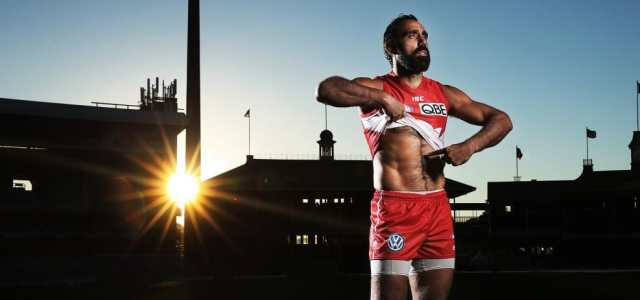Review: The Final Quarter
Australia is famously a sports loving nation. We see in sport a microcosm of life. The sporting contest provides a stage on which competitors can demonstrate admirable human virtues: determination, mastery, courage, striving, teamwork and leadership. We see risk and reward, triumph in the face of adversity, falling and getting back up. As a supporter, sport can provide a sense of community, the opportunity to feel like a part of something. But just as the sporting arena can bring out some of our best qualities, it can also reveal the uglier side of our culture. Ian Darling’s The Final Quarter focuses on just such an example.
In 2015, Australian footballer and indigenous activist Adam Goodes was unceremoniously hounded into retirement through a targeted, ongoing and racially charged campaign of booing by opposition supporters. Sportspeople have been booed before – it is seemingly accepted that paying for a ticket entitles a spectator to verbally abuse the competitors for the duration of the match – but this was on an unprecedented scale. Every time he touched the ball, week after week, boos would overwhelm the ground. So bad was it that this champion of the game – a two-time Brownlow Medalist, two-time premier whose 372 AFL games is the most by any indigenous player – chose not to participate in the traditional parade of retiring champions on Grand Final day for fear that the booing would continue.
Darling’s film takes us back to the inciting incident, the 2013 Indigenous Round match between Sydney and Collingwood in which Goodes pointed security in the direction of a fan who was shouting racist taunts. The fan, who turned out to be a 13 year old girl, was escorted from the ground on national television. Starting with the classy press conference in which Goodes defended the girl as an innocent child, requesting that she be left alone, while bemoaning the society that had but these words in her mouth, the film chronologically follows the events of the next three years that lead to his retirement. We see Collingwood President Eddie McGuire joking on his radio show that Goodes could be used to promote the upcoming King Kong stage show. We see Goodes being awarded 2014 Australian of the Year and balancing the performance of those duties with his continuing playing career; the outrage when he performs a war dance as a goal celebration; and the ongoing public debates about fans’ right to boo versus an individual’s right not to feel vilified and who gets to decide whether something is racist.
As a documentary, The Final Quarter is striking in its simplicity. It has no narrator and features no new interviews. Rather, following the model set out by British documentarian Asif Kapadia (director of Senna and Amy), the film is constructed entirely from archival material – broadcast footage, press conferences, newspaper headlines, radio soundbites. While that might sound dry and journalistic, the present tense nature of it gives the film a real sense of urgency. An achievement in assembly, this confronting story is made all the more confronting by this choice not to comment, just to show. It allows the voices of the time to speak for, and in the process to ultimately condemn, themselves.
The fact that there is no voice over narration doesn’t mean that the film doesn’t have a clear point of view. There is absolutely no doubt about what Darling’s take on the situation is. This was one of the darkest periods in Australian sporting history, made all the more shameful by the fact that it was so recent. More than a sport story, The Final Quarter is interested in what these events say about contemporary Australia more broadly, about our unwillingness to be in any way confronted by hard truths about the state of our country and its history. One of its more eloquent offerings comes from Waleed Aly in a featured clip from the sports panel show Offsiders: “Australia is generally a very tolerant society, until its minorities demonstrate that they don’t know their place. And at that moment, the minute someone in a minority acts as though they’re not a mere supplicant, then we lose our minds… The minute an indigenous man stands up and is something other than compliant, the backlash is huge and it is them who are creating division in our culture. And that is what we ultimately boo. We boo our discomfort.”
A powerful documentary, The Final Quarter boils with anger and leaves you to feel that because this is a story without catharsis. This is the story of a wrong that was never righted. The hero did not triumph. The villains did not get their comeuppance. However, on the eve of its premiere at the Sydney Film Festival, the AFL and all eighteen of its clubs issued an unreserved apology for their failure to act on the “treatment that drove [Goodes] from football.” The joint statement acknowledged that their “failure to call out racism and not standing up for one of our own let down all Aboriginal and Torres Strait Islander players, past and present,” and pledged to “fight all forms of racism and discrimination, on and off the field.” The filmmakers also plan to donate a copy of The Final Quarter to every school in Australia. So perhaps, in some small way, the spotlight this film shines can provide a silver lining to this dark cloud that so desperately needs one.
The Final Quarter Curriculum Resources are available here.
The Final Quarter is available to stream free on the 10 Plus app until 17 August.
Duncan McLean reviews films at his blog, Doctor of Movies.












